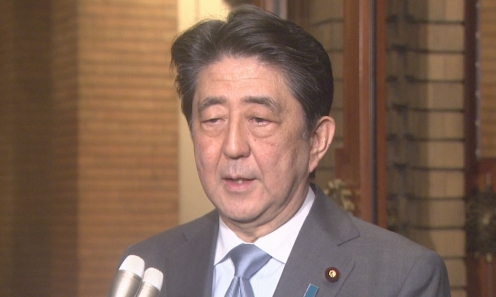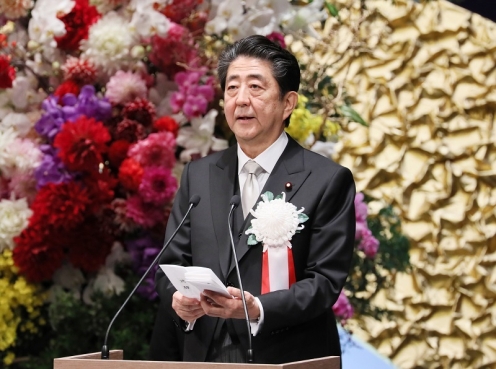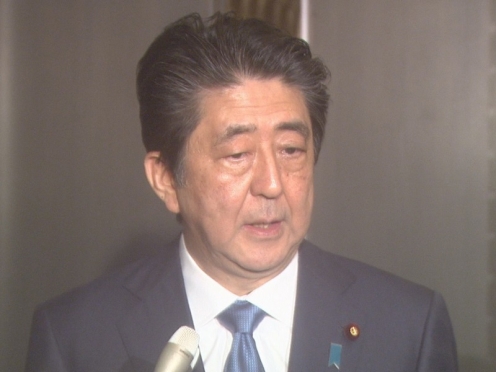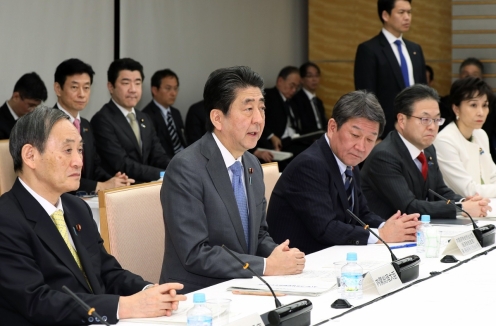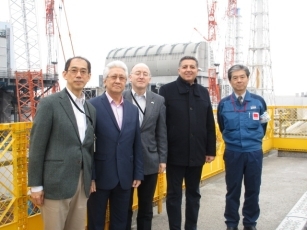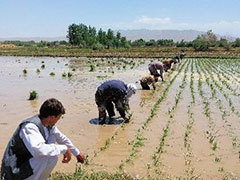Press Conference on the Summit Telephone Talk with President Trump of the United States
Cabinet Secretariat, Thursday, February 28, 2019
[Provisional Translation]
On February 28, 2019, Prime Minister Shinzo Abe held a press conference at the Prime Minister’s Official Residence.
With respect to the summit telephone talk with the Honorable Donald J. Trump, President of the United States of America, the Prime Minister said,
“I just held a summit talk with President Trump over the phone, and received a report on the outcome of the second U.S.-North Korea Summit Meeting. With his strong determination to achieve the denuclearization of the Korean Peninsula, President Trump decided he would not make any concession easily and at the same time continue constructive discussions and urge North Korea to take concrete actions. Japan fully supports that decision. As for the abductions issue, which is important for Japan, President Trump told me that he conveyed my outlook on the abductions issue to Chairman Kim Jong-Un at last night’s tête-à-tête (one-on-one meeting) with interpreters present. While I will refrain from explaining the details here, I was told that at the dinner following that meeting, President Trump again raised the abductions issue. The two leaders held a serious discussion on that matter.
I am determined that, next, I myself would have to meet face-to-face with Chairman Kim Jong-Un. I want Japan and the U.S. to continue to act in steady and close cooperation towards the resolution of a series of issues, namely the abductions issue, and the nuclear and missile issues.”
Commemoration Ceremony of the Thirtieth Anniversary of His Majesty The Emperor's Accession to the Throne
Cabinet Secretariat, Sunday, February 24, 2019
[Provisional Translation]
On February 24, 2019, Prime Minister Shinzo Abe attended the Commemoration Ceremony of the Thirtieth Anniversary of His Majesty the Emperor's Accession to the Throne, which was held in Tokyo in the presence of Their Majesties the Emperor and Empress of Japan.
Press Conference on the Summit Telephone Talk with President Trump of the United States
Cabinet Secretariat, Wednesday, February 20, 2019
[Provisional Translation]
On February 20, 2019, Prime Minister Shinzo Abe held a press conference at the Prime Minister’s Official Residence.
With respect to the summit telephone talk with the Honorable Donald J. Trump, President of the United States of America, the Prime Minister said,
“I held a summit talk with President Trump over the phone. In the lead-up to the second U.S.-North Korea Summit Meeting scheduled for next week, Japan and the United States thoroughly and closely aligned our policies.
We agreed that Japan and the U.S. would act in even closer cooperation at every level toward the resolution of the nuclear and missile issues as well as the abductions issue. In particular, President Trump and I spent a considerable amount of time speaking in-depth with about the abductions issue.
Yesterday, I met with some of the abductees family members and listened to their heartfelt wishes. When I spoke with President Trump just now, I requested his cooperation on this matter, including by conveying the family members’ feelings of how eagerly they wish to reunite with the abductees and how earnestly they hope for their return to Japan. President Trump listened to me and clearly stated that he understood very well how much importance I place on the abductions issue and, in light of that, he himself would also place importance on the abductions issue.. He gave me his word that he would cooperate towards resolving this issue, just as he did for the previous summit meeting.
He also confirmed that he would give me a report on the summit meeting and other matters by telephone after the summit meeting finishes.
I hope very strongly that this meeting will precipitate the resolution of the nuclear weapons and missiles issue, as well as the abductions issue, which is important, leading to peace and stability in East Asia. To that end, I intend for Japan and the U.S. to act in close cooperation to an even greater extent.”
“I refrain from making comments on maters other than that at this point.”
Meeting of the Council on Economic and Fiscal Policy
Cabinet Secretariat, Tuesday, February 26, 2019
[Provisional Translation]
On February 26, 2019, Prime Minister Shinzo Abe held the 3rd meeting of the Council on Economic and Fiscal Policy in 2019 at the Prime Minister’s Office.
At the meeting, a discussion was held on reforms toward realizing next-generation administrative services and regional revitalization.
Based on the discussion, the Prime Minister said,
“Today, we first discussed reforms towards next-generation administrative services. Among the various initiatives aiming at Society 5.0, the administrative services in national and local governments lag furthest behind. We should implement various initiatives, changing the way we work, so as to maintain the quality of administrative services amidst population decline and an ageing society. I believe that today’s discussions were based on quite a strong sense of urgency.
Based on the new proposals from the experts here today, we would like to continue our detailed discussions at this council and ensure they lead to actions. The Abe Cabinet will accelerate its all-out efforts in this area, centered on the Chief Cabinet Secretary, who chairs the Digital Government Ministers’ Meeting, with the cooperation of Minister Hirai, Minister Ishida, and other relevant ministers.
Afterwards, we held a discussion on regional revitalization. Looking beyond the Tokyo Olympic and Paralympic Games, we need to strengthen our capability to create revenue streams making full use of the characteristics of each area. To that end, it is important to increase the flows of people, money, and services into areas outside the major cities.
In particular, it would be an effective approach to promote inbound tourism, agricultural, forestry and fishery exports, and inward direct investment in an integrated manner. There can be no revitalization of Japan without vibrant regions. This is also an important issue for our economic and fiscal policy. I ask Minister Katayama and the relevant ministers to further review this matter while taking into consideration the points raised by the experts here today and I would like to hold a discussion on regional revitalization at this Council based on that.”
The Situation in Kashmir (Statement by Foreign Minister Taro Kono)
Foreign Affairs, Thursday, February 28, 2019
1. Japan is concerned about the deteriorating situation in Kashmir.
2. Japan strongly condemns the terrorist attack on 14 February 2019 for which the Islamic extremist group “Jaish-e-Mohammad” claimed responsibility. Japan urges Pakistan to take stronger measures to counter terrorism.
3. In response to the mounting tension due to the operations since 26 February between the Indian Air Force and the Pakistan Air Force, Japan strongly urges India and Pakistan to exercise restraint and stabilize the situation through dialogue.
IAEA Governors Invited to Japan
Foreign Affairs, Wednesday, February 27, 2019
1 Three Governors (the Arab Republic of Egypt, the Republic of Indonesia, the United Kingdom of Great Britain and Northern Ireland) of the International Atomic Energy Agency (IAEA) visited Japan from February 17 to 23 at the invitation of the Ministry of Foreign Affairs.
2 This invitation is one of Japan continued efforts to promote further deepening of the international community’s understanding of advanced efforts related to peaceful use of nuclear energy in Japan, in particular, Japan’s efforts mainly through health care and medical applications of radiation and its efforts following the accident at the Fukushima Daiichi Nuclear Power Station.
3 The delegation paid a courtesy call on Parliamentary Vice-Minister for Foreign Affairs Kiyoto Tsuji and exchanged views with experts related to the peaceful use of nuclear energy. The delegation visited the following facilities:
(1) Takasaki Advanced Radiation Research Institute of the National Institutes for Quantum and Radiological Science and Technology (QST);
(2) Heavy ion radiotherapy facilities for cancer treatments at Gumma University and Hidaka Hospital;
(3) The showroom of Shimadzu Corporation (the corporation signed a Memorandum of Cooperation with the IAEA in October 2017 and donated its mass spectrometry equipment to the IAEA Laboratories in Seibersdorf).
In addition, the delegation visited the Fukushima Daiichi Nuclear Power Station and the TEPCO Decommissioning Archive Center and observed the sites of the reactor decommissioning, contaminated water management and other efforts that Japan has undertaken.
(Note: The IAEA promotes the peaceful uses of nuclear energy as one of its major goals, and has carried out technical cooperation activities for developing countries in a variety of fields. There has been a growing interest among developing countries in health care and medical applications of radiation.)
The Signing of the First Protocol to Amend the Agreement on Comprehensive Economic Partnership among Japan and Member States of the Association of Southeast Asian Nations
Foreign Affairs, Tuesday, February 26, 2019
1. On February 26 (Tue.), the Government of Japan decided at its Cabinet Meeting to sign the First Protocol to Amend the Agreement on Comprehensive Economic Partnership among Japan and Member States of the Association of Southeast Asian Nations (ASEAN).
2. Based on this decision, the Mr. Taro Kono, Minister for Foreign Affairs will sign the Protocol on February 27.
3. It is expected that the Protocol will promote the liberalization and facilitation of trade in services and investment between Japan and ASEAN Member States and will strengthen reciprocal economic ties in wide-ranging fields, vitalizing further the economy of Japan and the ASEAN Member States.
Signing of the Bilateral Swap Arrangement between Japan and India
Ministry of Finance, Thursday, February 28, 2019
The Bank of Japan (BOJ), acting as the agent for the Minister of Finance of Japan, and the Reserve Bank of India (RBI) signed a Bilateral Swap Arrangement (BSA) that takes effect from today (February 28, 2019). The BSA enables both countries to swap their local currencies (i.e., either Japanese yen or Indian rupee) against US dollar for an amount of up to USD 75 billion.
The authorities of both countries believe that, by enhancing financial cooperation, the BSA will contribute to the stability of financial markets, thereby further developing the economic and trade ties between the two countries.
Supporting Sustainable Agriculture in Afghanistan
JICA, Tuesday, February 26, 2019
Afghanistan is experiencing one of the worst droughts in history. In Afghanistan, where farmers make up about 80 percent of the population, agricultural stability is national stability. With the drought expected to be drawn out because of climate change and other factors, JICA is continuing its support of both hard infrastructure such as irrigation and soft infrastructure such as promoting rice growing and building the country's capacity for policymaking, to build a foundation to allow agriculture to continue.
If they could continue farming, they would rather not fight
" Some farmers join antigovernment forces to feed their families often because of falling agricultural incomes due to droughts. No one would want to fight in a war if they could continue farming," said JICA Senior Advisor Kenji Nagata.
Since the Taliban government collapsed in 2001, the international community has been providing various kinds of reconstruction assistance in Afghanistan, but it cannot be said that farmers' lives have improved sufficiently.
An important key to reconstructing Afghanistan is to develop basic infrastructure for sustainable agriculture. From 2014 to 2017, Mr. Nagata served as water resources development and management adviser at Afghanistan's Ministry of Energy and Water. Currently he's engaged in disseminating throughout Afghanistan the PMS irrigation method, which was applied in the irrigation projects that JICA and the international NGO Peace (Japan) Medical Services (PMS) have been carrying out together. PMS is active in the field of medicine and agriculture in Afghanistan.
PMS is the Afghanistan NGO headed by medical doctor Tetsu Nakamura and supported by Japanese NGO Peshawar-kai. It has been carrying out the irrigation project since 2003 in eastern Afghanistan using stone and tree-planting techniques suitable to the local area. Farmers carry out the construction, and maintain and manage the irrigation facilities themselves, which will lead to increased employment for repatriated refugees and for soldiers who have been reintegrated into society.
In the area where the PMS irrigation project was implemented, so far it has rehabilitated more than 16,000 hectares into farmland. A farmer who responded to a questionnaire on the project said that compared to before it was carried out, more irrigation water is available, allowing him to irrigate twice a year, and his income has increased.
High hopes for Japan’s reconstruction assistance
JICA has been supporting PMS' irrigation projects since 2010. For its support for Afghanistan, where work in the field is limited by the security situation, a partnership with an NGO that has worked there for many years and is well-versed in the local situation is essential.
At the Geneva Ministrial Conference on Afghanistan in November 2018, Minister of Finance Mohammad Humayon Qayoumi pointed out that the majority of projects to assist Afghanistan have been led by foreign aid agencies and in some cases their work has not been sustained after the project completed. Taking this into consideration, "The example of PMS, which made use of local technology, is quite meaningful," he said.
"It's important to work on development from a long-term point of view to strengthen Afghanistan's capacity to cope with droughts while supporting the leadership of the Afghan government," said JICA Vice President Junichi Yamada, who participated in the meeting.
Doubling productivity by improving rice-cultivation techniques
JICA is implementing a project to improve rice-cultivation techniques in regions with relatively little drought damage. In Afghanistan, rice is the second most important staple crop next to wheat. "Afghanistan has been involved in wars for a long time, its agricultural infrastructure, including irrigation facilities, are damaged, it has no rice experts and it is behind in disseminating improved rice cultivation techniques," said JICA Expert Masataka Nakahara, who has been engaged in reconstruction and development assistance since 2005 and in agriculture projects since 2014.
With the government's limited capacity to help rice production farmers, JICA started a project of improving rice-based agriculture in Nangarhar Province in eastern Afghanistan in 2007. Based on the encouraging results of that project, JICA further extended its capacity building to improve rice productivity and quality for agricultural extension officers, researchers and farmers through the project "Rice-based Agriculture Development in Afghanistan," which began in 2011 targeting eight provinces.
As a result, from 2014 to 2017, the average rice yields of some 2,500 demonstration farmers were 6.3 tons per hectare (paddy), almost double the amount produced by conventional techniques.
Now the project is aiming to support improved seed production, post-harvest processing technology and improved quality. The long-term JICA training project "Project for the Promotion and Enhancement of the Afghan Capacity for Effective Development (PEACE)" aims to train human resources responsible for the development of Afghanistan. Through PEACE, participants learn about agricultural economics and rice-growing techniques at Japanese universities. JICA also works with the participants after they return to Afghanistan.
In Afghanistan, where authority is concentrated in the central government, local needs are often not reflected in government policies. That's why JICA created a mechanism for the Ministry of Agriculture, Irrigation and Livestock and local farm bureaus to share information on local issues and aim for solutions, and is providing support through a project to enhance their organizations so that this will lead to effective policies.

























